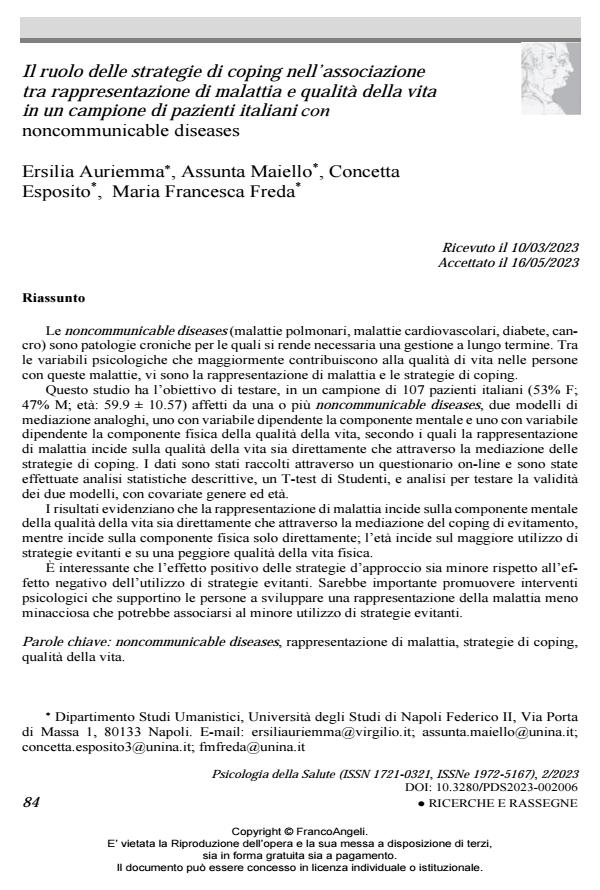Il ruolo delle strategie di coping nell’associazione tra rappresentazione di malattia e qualità della vita in un campione di pazienti italiani con noncommunicable diseases
Titolo Rivista PSICOLOGIA DELLA SALUTE
Autori/Curatori Ersilia Auriemma, Assunta Maiello, Concetta Esposito, Maria Francesca Freda
Anno di pubblicazione 2023 Fascicolo 2023/2
Lingua Italiano Numero pagine 19 P. 84-102 Dimensione file 295 KB
DOI 10.3280/PDS2023-002006
Il DOI è il codice a barre della proprietà intellettuale: per saperne di più
clicca qui
Qui sotto puoi vedere in anteprima la prima pagina di questo articolo.
Se questo articolo ti interessa, lo puoi acquistare (e scaricare in formato pdf) seguendo le facili indicazioni per acquistare il download credit. Acquista Download Credits per scaricare questo Articolo in formato PDF

FrancoAngeli è membro della Publishers International Linking Association, Inc (PILA), associazione indipendente e non profit per facilitare (attraverso i servizi tecnologici implementati da CrossRef.org) l’accesso degli studiosi ai contenuti digitali nelle pubblicazioni professionali e scientifiche.
Le noncommunicable diseases (malattie polmonari, malattie cardiovascolari, diabete, can-cro) sono patologie croniche per le quali si rende necessaria una gestione a lungo termine. Tra le variabili psicologiche che maggiormente contribuiscono alla qualità di vita nelle persone con queste malattie, vi sono la rappresentazione di malattia e le strategie di coping. Questo studio ha l’obiettivo di testare, in un campione di 107 pazienti italiani (53% F; 47% M; età: 59.9 ± 10.57) affetti da una o più noncommunicable diseases, due modelli di media-zione analoghi, uno con variabile dipendente la componente mentale e uno con variabile dipen-dente la componente fisica della qualità della vita, secondo i quali la rappresentazione di malat-tia incide sulla qualità della vita sia direttamente che attraverso la mediazione delle strategie di coping. I dati sono stati raccolti attraverso un questionario on-line e sono state effettuate analisi statistiche descrittive, un T-test di Studenti, e analisi per testare la validità dei due modelli, con covariate genere ed età. I risultati evidenziano che la rappresentazione di malattia incide sulla componente mentale della qualità della vita sia direttamente che attraverso la mediazione del coping di evitamento, mentre incide sulla componente fisica solo direttamente; l’età incide sul maggiore utilizzo di strategie evitanti e su una peggiore qualità della vita fisica. È interessante che l’effetto positivo delle strategie d’approccio sia minore rispetto all’effetto negativo dell’utilizzo di strategie evitanti. Sarebbe importante promuovere interventi psicologici che supportino le persone a sviluppare una rappresentazione della malattia meno minacciosa che potrebbe associarsi al minore utilizzo di strategie evitanti.
Parole chiave:noncommunicable diseases, rappresentazione di malattia, strategie di coping, qualità della vita.
- Understanding self-care behaviors in older adults with chronic diseases: The influence of personal views on aging and illness perceptions Fabrizio Mezza, Daniela Lemmo, Antonio Bianco, Alessandra Cuomo, Maria Francesca Freda, in Geriatric Nursing 103694/2025 pp.103694
DOI: 10.1016/j.gerinurse.2025.103694
Ersilia Auriemma, Assunta Maiello, Concetta Esposito, Maria Francesca Freda, Il ruolo delle strategie di coping nell’associazione tra rappresentazione di malattia e qualità della vita in un campione di pazienti italiani con noncommunicable diseases in "PSICOLOGIA DELLA SALUTE" 2/2023, pp 84-102, DOI: 10.3280/PDS2023-002006